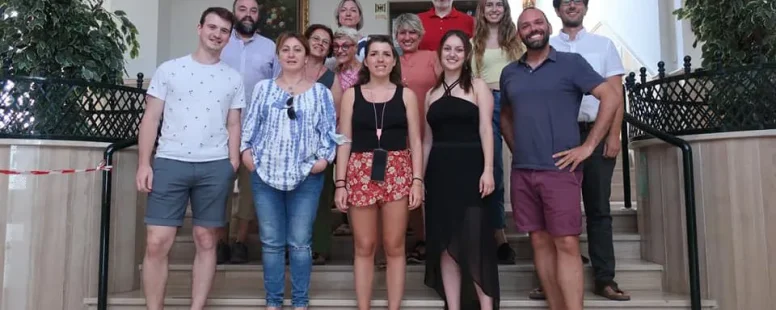LTTA in Spain: STIT Course
Summary
Venue: La Blanca Paloma VET centre premises in La Zubia, Granada, Spain
Date: 26 – 28 July 2022
Participants: 15 participants (1 staff member and 2 educators per partner). Profile:
Objectives: To exchange views, learn and teach about inclusion and digital accessibility: history, theoretical background, legal frameworks, approaches, and terminology.
Content:
- Flipnet describee the “flipped approach” according to which, before the in-class time students explore new course content outside of class, by viewing pre-recorded lecture videos or developing a digital module.
- AFORISMA focused their intervention on visual impairments.
- FDO focused on mental disabilities and career counselling addressed to people with special needs.
- VMEH described the phenomenon of early school leaving in Romania.
- QZR and Bexley illustrated the importance of Open Educational Resources and practices for teachers and learners with disabilities in the topic of Accessibility.
Additionally, Leticia Rodríguez Merelo the Coordinator of Social Services for the provinces of Granada, Almería and Jaén (Andalusia, Spain) from ONCE visited the STIT group and presented the partners the main experience developed at National level with people visually impaired. She described the state of the art in terms of accessibility at EU level legislation, starting from the major achievements of great importance reached together with organizations from the world of disability, such as the UN Convention on the Rights of People with Disabilities.
Recognition and Validation:
For recognition and validation of the participants learning outcomes, we used the Europass Mobility Certification.
Programme
Day 1 – Digital Teaching and Digital Learning
Morning – Lecture. Starting from the description of the “flipped approach”, Flipnet will illustrate the principles, digital tools and techniques used for years by the Association for teaching.
Afternoon – Laboratories:
- The distance learning: a methodological approach. How to plan and implement a distance lesson.
- Which platforms to use to work remotely.
- How to interact and activate tools for remote student assessment.
Day 2 – Inclusive Education
Morning – Lecture. Starting from their practical professional experience with people with disabilities, VET partners will explain the importance of accessibility for disabled students in educational contexts.
Afternoon – Laboratories:
- What does it mean Inclusion in (distance) Education?
- Legal frameworks on Educational Inclusion in Italy, Spain, Romania.
- Disabilities and SEN students in the STIT partners education and training experiences.
Day 3 – IT for Teaching and Accessibility in Learning
Morning – Lecture. Starting from their professional skills, the technical partners (QZR and Bexley) will describe the meaning and the value of the OER for an equitable access to education. The topic will be the occasion to introduce the PRs structure to be implemented during the project.
Afternoon – Laboratories:
- What does it mean Accessibility?
- The importance of crowdsourcing platform in Education and Training.
Tools for SEN are tools for everybody.
